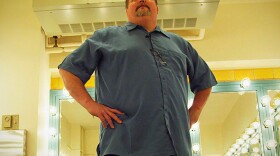Charlie Ornstein, a reporter for the investigative newsroom ProPublica, had covered healthcare in America for more than 15 years, and he thought he understood the decision a family would face if a relative were being kept alive through artificial life support.
But when Ornstein’s 70-year-old mother stopped breathing in the hospital for nine minutes, doctors connected her to a ventilator. And Ornstein began to question some of his assumptions about the healthcare system.
Highlights from his interview with Dick Gordon:
You wrote in an article for ProPublica that “None of my years have prepared me for this.” What did you mean by that?
I’ve obviously dealt with dozens, and probably hundreds of patients since I’ve written about the health care system, sort of the maddening complexity of the system, the way in which medical errors have caused untold harm and grief for parents, for children, for siblings, for relatives, for caregivers. And yet when it came to the issues of end-of-life-care and death, I think I had sort of accepted the notion that when death was near, we spent way too much money trying to keep people alive, and weren’t able to accept the fact that death was near, and that this was sort of a crippling cost on the health care system. When I went through it with my mom, I really had a different perspective.
What were you hearing from the doctors?
I spoke to her neurologist, and the sense was that you begin to make decisions at the 72-hour mark. That’s the point at which, if you’re not seeing recovery, you very likely won’t. So my sister, my dad and I left the hospital that afternoon, and we went to a Chinese restaurant. That’s where we had our family meeting, where – I think we had danced around the topic a little bit – this is where we laid it out on the table. We had a conversation about what it was that we would want. I felt really strongly about some things that were my guiding principles in this, and they were my dad and my sister’s as well.
First of all, I felt like, “No one is going to rush us to make a decision here.” If my mother is not going to recover, well she’s not going to recover in a couple of days, or she’s not going to recover in four days, we don’t need to be pushed into making a decision – not that anyone was trying to do that, but that was one of my key things.
The second is that I very much wanted someone that was not involved in this case at all to come in and sort of offer a perspective. And so we made the decision at night that we wanted to have yet another opinion; another neurologist who wasn’t her neurologist, who wasn’t in the practice of her neurologist. Somebody that we knew had given us a recommendation, and she came the next morning, and examined my mom and talked to us, and sort of confirmed what we had heard from my mom’s treating neurologist. She said, “If you want, there are a couple of more tests that could be done.” So when you hear something like that, you’re like, “Well, if they can be done, well then they should be done because we need all the information that we possibly can have.”
How did this experience change your thinking about end-of-life care?
In a variety of ways. First, I feel like societally we’ve allowed political slogans -- and this completely manufactured conversation about “death panels” -- to prevent us from having a sophisticated conversation about end of life care. There are so many people who are in my situation. This has just traumatized them to be in this position, and we boil it down to talking about the government trying to create death panels? Nobody created death panels. These are real families having to deal with real decisions, and we offer no support. So that’s the first thing.
The second thing is: We have to have a conversation that separates out end-stage dementia, and end-stage cancer, and things like that to things like what my mom had. What do you do in the case of somebody who was OK and who had a stroke? Or who had a heart attack? Or who had a seizure and is now in the ICU? And how do you deal with those things? Because it’s quite different, and you don’t have that same time to plan and discuss, and go through everything that could happen with your loved one. I just felt like we were so alone, and so many people were alone. Gosh, I wish we could discuss that more.
Hear the full interview at The Story's website. Also in this show: Dick Gordon remembers the time he was working for the Canadian Broadcasting Corporation in London and Margaret Thatcher welcomed him to 10 Downing Street. And Mexican painter Frida Kahlo’s clothes were locked up for 50 years. We speak with the woman who created an exhibit with them.






